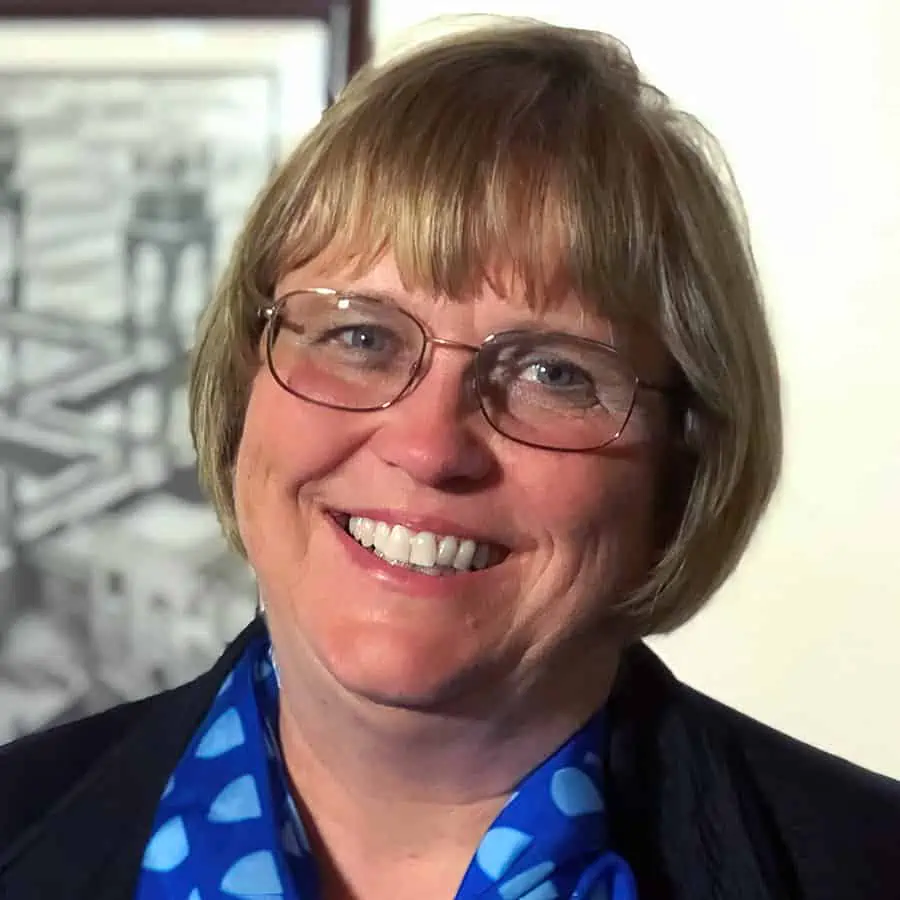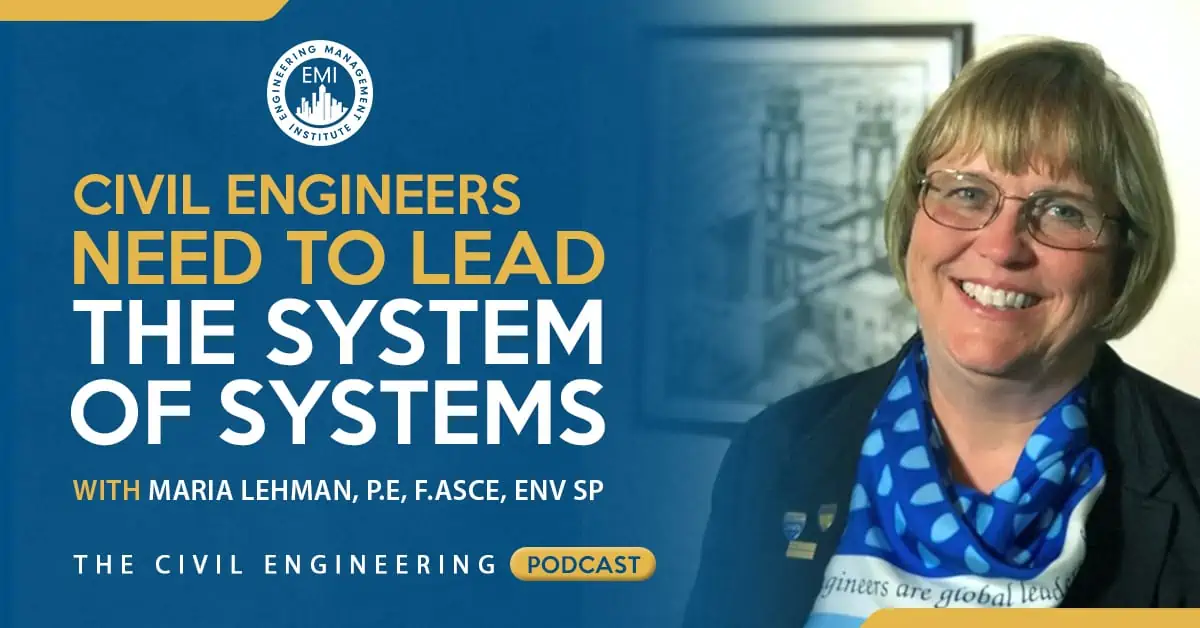Podcast: Play in new window | Download | Embed
In this episode of The Civil Engineering Podcast, I talk to Maria Lehman, P.E., F.ASCE, ENV SP, the Director of U.S. Infrastructure at GHD, and an official nominee for the worldwide ASCE President-Elect 2021. Maria will be talking about America’s infrastructure, the ASCE Report Card, the needs of the civil engineering profession, and how civil engineers need to lead the system of systems.
Engineering Quotes:
Here Are Some of the Questions I Ask Maria Lehman on How Civil Engineers Need to Lead the System of Systems:
- The American Society of Civil Engineers unveiled their 2021 Report Card for America’s Infrastructure on March 3rd. Can you share with us some of the results and grades that were given to the different sectors?
- The Failure to Act: Economic Impacts of Status Quo Investment Across Infrastructure Systems quantifies how the persistent failure to invest in our aging infrastructure impacts the economy. Can you share some of its findings and how it affects the cost to families when we don’t invest in infrastructure?
- How do you successfully deliver mega-projects?
- How would you say civil engineers need to lead the system of systems?
- Do you have any advice for civil engineers out there who are planning to get involved with mega-projects, or who are considering pursuing a career similar to yours?
- You are a nominee for the ASCE President-Elect 2021. Can you share with us what your vision is as a nominee?
Here Are Some Key Points Discussed in This Episode About Leading the Systems of Systems:
- Things are changing so rapidly in the business world that bringing people together who normally don’t work together is needed. Anytime that you are trying to drive change, you need to have a group of people who are bought into that change.
- It is different when you work on the public side of things; it’s a different reality with different priorities. Understanding the differences and being able to bridge that communication helps you to be more efficient and effective with clients.
- The accumulative average of the America’s Infrastructure Report Card is a C-; it is primarily there because a couple of the electric transmission and rail’s scores are in the B’s because it is privately funded. The Report Card received 2 B’s, 4 C’s, and 11 D’s, and most of the public infrastructure received D’s.
- Our infrastructure is not a mid-life crisis, it’s in an old-age crisis. Because it is a system of systems, you see a lot of domino effect. It’s the weakest link that causes the problem, and that is why we do not only need investment, we also need to think about everything being a system of systems.
- ASCE has been doing independent economic studies to what the cost of failure is. There were three reports done:
-
- Electric transmission
- Water
- Transportation services, as well as composite
- The composite was released right before the Report Card and detailed that the cost of not investing in our infrastructure is $3,300 per family, per year over the next 10 years. This has to do with things such as delays due to traffic, potholes, and uninterrupted power supply. It is important to know that it is not only you as the individual who is being impacted, but also the cost of your goods. If there is a disruption in the supply chain, you are eventually going to pay for it by paying more for every commodity that you have. These are the kind of conversations we need to be having with people to get moving here.
- Managing mega-projects is about having a lot of baseline studies, but it is also about transparency. You need to have regular communication with the communities and the naysayers because you need to understand why they are stopping projects. My advice to young engineers who would like to get involved in megaprojects is to always volunteer when an opportunity arises, as you are going to learn a new skill in the process. Remember that you don’t have to work for some of the largest companies in the world to work on some of the largest projects.
- The civil engineering profession was born because there was first military engineering. It then became civil because it was non-military work. Every other branch of engineering came from civil engineering. So by definition, civil engineering is the whole package. If you have worked in enough pieces of that practice, you will know enough to ask enough questions. I really believe that these bigger projects need to include a civil engineer because you need to understand how all these pieces come together.
Maria Lehman’s Vision as Nominee for the ASCE President Elect 2021:
- I would like to have civil engineers lead the infrastructure of tomorrow and of our future world vision. Our infrastructure is the design-life of what we are seeing right now, and it is functioning 50-100 years out. It’s important to think about it long term and determine if you are in a position to make a decision that will work in 50-100 years.
- I also think about the context of where we are right now, and I think we are in a confluence of crises. We have public health crises, economic crises, equity crises, and infrastructure crises, all at the same time. Infrastructure is the key to solving all four because as you build buildings and facilities that are more human-centric, it will diminish all the issues.
- There is also a huge potential for workforce development to be able to get people in the industry and get the people who were displaced throughout the pandemic into jobs.
- I am concerned about the health of ASCE. There is no such thing as a 501(c)(3) that is healthy, ever. We need to look at streamlining our internal overhead structures and how we deliver so that every last dollar we can push toward member services can be used.
- I am very interested in diversion and inclusion. Numbers have not changed drastically and we need to do better. Whether it is women or people of color, we need to do better and represent the communities that we work in.
- The demographics of civil engineering are generally grain, and we don’t have as many people coming into the pipeline. We need more younger members to join ASCE and engage our life members and older members to help direct, mentor, and get the younger members to get a head start.
More Details in This Episode…
About Maria Lehman, P.E, F.ASCE, ENV SP

She has served as Principal-in-Charge, Project Executive, Program and Project Manager, and Project Engineer on more than 700 projects that required everything from scoping, planning, environmental studies, preparation of plans, specifications, estimates, and construction management and operations and maintenance, ranging in size from $10,000 to $3.9 billion. Her strength has been in the area of complex element coordination; well-developed project communications, government and community relations, including innovative finance and grants; and fast track implementation on complex projects. She has successfully led alternative delivery projects such as Design Build, Best Value, and Public Private Partnerships.
Maria has served ASCE since her days at UB, first as a student, then Younger Member. She co-founded the Northeast Region Younger Members Council in 1983, stayed active in her Section serving all board positions, including president in 1990, while her husband Carl was President-Elect. She was a delegate to the NYS and District 1 Councils and became a Society Director in 1993, followed by Zone 1 Vice President in 2001. She has continuously served or chaired numerous national committees, councils, and institutes since 1993. She returned to the National Board in 2018 as Assistant Treasurer.
Maria has won numerous national, statewide, and local awards, including the ASCE President’s Medal, UB’s School of Engineering Alumna of the Year, and the New York State Society of Professional Engineers Engineering Manager of the Year.
Sources/References:
Connect with Maria Lehman on LinkedIn
Connect with Maria Lehman on Facebook
Engineering Leadership Accelerator Course
The American Society of Civil Engineers
This Episode Is Brought to You by ACI
Are you a member of The American Concrete Institute? ACI is a worldwide community of 30,000 professionals, educators, and students in more than 100 countries. It is the premier global community dedicated to the best use of concrete.
Starting on January 1 this year, ACI launched new member benefits. ACI members now have free access — through annual subscriptions — to all ACI University live webinars, free access to 260+ on-demand courses, and unlimited access to the Institute’s practices (including all ACI guides and reports) and symposium volumes.
ACI members push the concrete industry further by adapting to new technology and investing in their careers, and are dedicated to improving concrete design, materials, and construction. You do not have to be an ACI member to work in the concrete industry. If you want to exceed expectations in it, there is no better place to be. Whether you are a student just starting or have years under your belt, ACI membership ensures that no matter what changes the world brings, you will be prepared to thrive, and your life’s work will last for generations. Right now, ACI is offering a $30 discount on new Individual and Young Professional Memberships — student memberships are free! Join ACI today at concrete.org/PODCAST30.
Books Mentioned in this Episode:
Please leave your comments or questions in the section below on how you think civil engineers need to lead the system of systems.
To your success,
Anthony Fasano, PE, LEED AP
Engineering Management Institute
Author of Engineer Your Own Success











